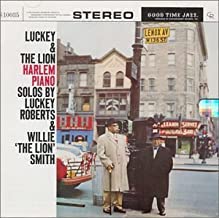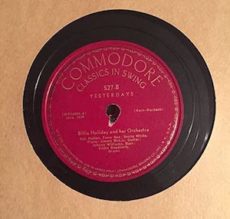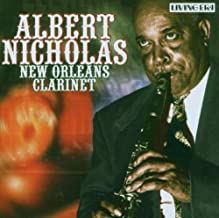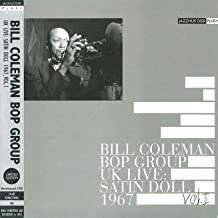
Daily Dose Of Jazz…
Luckey Roberts was born Charles Luckyth Roberts on August 7, 1887 in Philadelphia, Pennsylvania, and was playing piano and acting professionally with traveling Negro minstrel shows in his childhood. Settling in New York City about 1910 he became one of the leading pianists in Harlem, and started publishing some of his original rags.
Roberts toured France and the UK with James Reese Europe during World War I, then returned to New York where he wrote music for various shows and recorded piano rolls. With James P. Johnson, he developed the stride piano style of playing about 1919.
His reach on the keyboard was unusually large and Luckey could reach a fourteenth, leading to a rumor that he had the webbing between his fingers surgically cut. Those who knew him and saw him play live denounced it as false, he simply had naturally large hands with a wide finger spread.
By the 1920s Roberts teamed up with lyricist Alex C. Rogers, co-wrote three Broadway musicals, Go-Go and Sharlee in 1923, and My Magnolia in 1926, the latter starred Adelaide Hall, a major black revue star.
Hisnoted compositions include Junk Man Rag, Moonlight Cocktail, Pork and Beans, and Railroad Blues. The Glenn Miller Orchestra recorded Moonlight Cocktail, and was the best selling record in the United States for ten weeks in 1942.An astute businessman, he became a millionaire twice through real estate dealings. Pianist and composer Luckey Roberts, who recorded piano solos with Willie “the Lion “ Smith, passed away on February 5, 1968 in New York City.

Daily Dose Of Jazz…
Eddie Dougherty was born July 17, 1915 in Brooklyn, New York. Playing drums from age 13, then started working with Billy Gusak before Dickie Wells’s band at 18 in Harlem, New York by the beginning of the 1930s. He gigged regularly up through 1940 with Kenny Watts & His Kilowatts. His recording career started as a sideman in the 1930s, with Taft Jordan, Frank Froeba, Mildred Bailey, Harry James, Billie Holiday, Frankie Newton, Pete Johnson, and Meade Lux Lewis.
Alongside this he held a gig as the drummer for Keny Watts and his Kilowatts through 1940. He subbed for Dave Tough in the Bud Freeman Orchestra in 1940, then played with Art Tatum, Joe Sullivan, Benny Carter, Benny Morton, and others in the first half of the 1940s. He worked with James P. Johnson several times, including on 1944 recording sessions. His later work included recordings with Cliff Jackson, Mary Lou Williams, Clyde Bernhardt, Wilbur De Paris, Teddy Wilson, and Albert Nicholas. He was still active into the 1980s.
When he finally retired from full-time music decades later, he had amassed a list of credits that not only rivals the length of some short stories, but represented a thorough involvement in many different styles of jazz, vocal music, and rhythm & blues. Drummer Eddie Dougherty passed away on December 14, 1994 in Brooklyn.
More Posts: drums,history,instrumental,jazz,music

Daily Dose Of Jazz…
Albert Nicholas was born on May 27, 1900 in New Orleans, Louisiana and his primary instrument was the clarinet, which he studied with Lorenzo Tio in his hometown of New Orleans. Late in the 1910s he played with Buddy Petit, King Oliver, and Manuel Perez.
Spending three years in the Merchant Marines, he then joined Oliver in Chicago, Illinois from 1925 to 1927. After time in East Asia and Egypt, he returned to New York City in 1928 and played with Luis Russell until 1933. During this time in the city Albert played with Red Allen, Charlie Holmes, and J. C. Higginbotham. He would later play with Chick Webb, and Louis Armstrong with Russell and Jelly Roll Morton.
The Dixieland jazz revival of the late 1940s reinvigorated his career, playing with Art Hodes, Bunk Johnson, and Kid Ory. Nicholas had a regular gig with Ralph Sutton in 1948. In 1953 he moved to France and except for recording sessions in the U.S. in 1959-60, he remained there for the rest of his life.
Clarinetist Albert Nicholas, who was active from his teen years until his death, passed away on September 3, 1973 in Base, Switzerland.
More Posts: clarinet,history,intrumental,jazz,music

Daily Dose Of Jazz…
Born May 18, 1894 in North Buxton, Ontario, Canada, Louis Stanley Hooper was raised in Ypsilanti, Michigan. He attended the Detroit Conservatory, where he played locally in dance orchestras in the 1910s. He then moved to New York City around 1920, recorded with Elmer Snowden and Bob Fuller frequently in the middle of the decade, and performed with both of them in Harlem as well as with other ensembles.
Hooper served for some time as the house pianist for Ajax Records and accompanied many blues singers on record, including Martha Copeland, Rosa Henderson, Lizzie Miles, Monette Moore, and Ethel Waters. He participated in the Blackbirds Revue of 1928.
In 1932 returning to Canada he played in Mynie Sutton’s dance band, the Canadian Ambassadors. Lou did local work solo and in ensembles for the next two decades, then was brought back into the limelight by the Montreal Vintage Music Society in 1962. He released an LP of ragtime piano tunes in 1973 entitled Lou Hooper, Piano.
As an educator he taught at the University of Prince Edward Island late in his life and appeared regularly on CBC television in Halifax. His papers, which include unpublished compositions and an autobiography, are now held at the National Library of Canada in Ottawa, Ontario. Pianist Lou Hooper passed away on September 17, 1977, Charlottetown, Prince Edward Island.
More Posts: bandleader,composer,history,instrumental,jazz,music,piano

Daily Dose Of Jazz…
De Priest E. B. Wheeler was born on March 1, 1903 in Kansas City, Missouri and played trumpet and mellophone in The Knights of Pythias Band while attending Lincoln High School. With the band he journeyed to St. Louis, Missouri in 1917. Returning to Kansas City he worked in a local dance hall for a year, before becoming a member of the resident band at the Chauffeur’s Club in St. Louis in 1918.
He was with Dave Lewis’s Jazz Boys in Kansas City, then toured with a circus band until 1922. Joining the Wilson Robinson Syncopators in St. Louis in 1923, he toured the Pantages Circuit from Chicago, Illinois to California with that band. The band eventually settled in New York in early 1925 where they were renamed Andy Preer And His Cotton Club Orchestra. Subsequently they worked under the leadership of violinist Andrew Freer until his death in 1927. Later on the group became known as The Missourians, and when Cab Calloway joined as a singer in 1928, from 1930 on he took over and they became Cab’s band.
Wheeler remained with Calloway until 1940, touring Europe in 1934. He worked for the postal authorities for many years, but continued to play part-time with bands and orchestras through the 1950s. Trombonist De Preist Wheeler passed away April 10, 1998 in St. Albans, Queens, New York.
More Posts: history,instrumental,jazz,music,trombone





